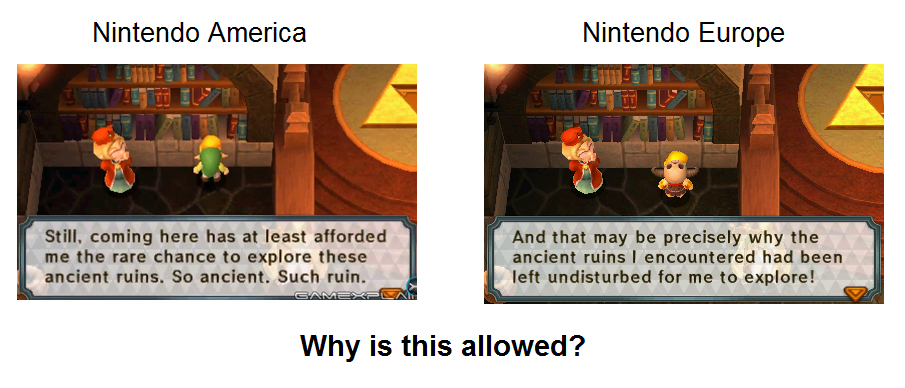Recently, Rhythm Heaven Megamix came out for the Nintendo 3DS, and with it came new addition to the series: story mode. The writing made me chuckle a few times, especially with the main character's signature catchphrase: "Let's we go, amigo!". That phrase is not included in the Japanese version, yet adds a special charm to the game for its English debut. It is moments like these that captures the reason why Nintendo does not literally just translate word for word.
First of all, let's get one thing straight: this is not an article about censorship. We're talking about changes in the writing of the game itself. For all the flack that the translation that Fire Emblem Fates gets, you can name countless quotes that are unforgettable to fans of the game that did not originate from the Japanese game ("You have the devil's own luck" is one of my personal favorites). That is the key to localization: it's not only about adapting Japanese cultures to an American audience, but about creating a memorable experience. We can use the above image as another example. The American version has a reference to an Internet joke called "doge" while the European translation removes this reference. The dialogue on the left is arguably more memorable or likely to get a chuckle out of someone compared to the right. Even if the reader is oblivious to the reference, the grammatical syntax can just be seen as a quirk of the character. To those that say that the reference is in bad taste or will confuse the players, many many other Nintendo games praised for their writing (like Earthbound) and in fact many other media also make references that are relevant only to a cetrain. Is Citizen Kane a bad movie because of its use of references to other films from the early 1900s that many today have never heard of?
In addition, sometimes it's not just about improving the writing of the original. Jokes do not always crossover very well across languages. Here is an example of a Japanese joke translated literally: "Why do Hawaiians never need to go to the dentist? Because Hawaiians have good teeth." ...Did that make sense to you? To most people, not really. The reason why it's funny in Japanese is because "good teeth" in Japanese is audibly said as "ha wa ii". There are countless more examples, hence why localization is necessary in order for English players to still enjoy the game instead of being confused by literally translated jokes.
Some may wonder why localization happens in the video game industry but not in other industries. Here's some news for those people: localization isn't just limited to video games and isn't anything new. In fact, there are easily over one hundred English translations for the Iliad and the Odyssey, the ancient Greek classics that revolutionized literature. These translations vary by how faithful they are to the original and by how much the authors want to deviate from the literal to convey's Homer's poetic language. The same could be said for how Nintendo localizes: they try to deviate from the literal to convey what the original writers intended the players to feel. While the translations are praised for it, Nintendo is criticized for it.
Localization is not destroying the original writing; it's about adaptation. While some decisions made by Nintendo's localization team may be arguable, they produce memorable writing that sticks with fans for a long time. A completely literal translation is not possible without alienating the player, as can be seen with the many translations for Homer's epics and puns that rely on word play. Localization is not against the interest of the consumer; it is necessary in order for players to get what the original artists tried to convey, and may in fact enhance the experience in some cases. So before you start a petition telling Nintendo to just translate literally, think about how Hawaiians having good teeth isn't exactly the best joke to tell in Nintendo's next big game.

No comments:
Post a Comment